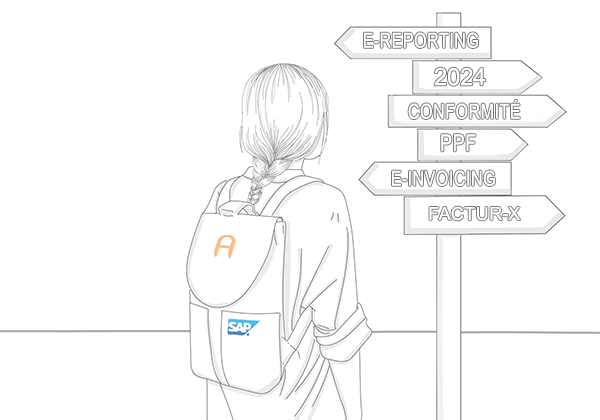Frequently asked questions : Applium answers!
The A2C connector is Applium’s answer to the French e-invoicing obligation!
> Who is concerned?
The reform applies to companies established in France that are subject to VAT, whether or not they are liable for VAT. Certain exceptions exist, however, such as for taxable companies that carry out exclusively exempt operations within the meaning of articles 261 to 261 E of the CGI (health, teaching activities…).
> What impact will this have on the invoicing of my French and foreign customers?
The reform contains two complementary obligations:
- e-invoicing, if your business partner is also subject to VAT and established in France,
- Le e-reporting, the obligation to transmit transaction data if your business partner is a foreign company or an individual customer.
> Can I send my invoices directly to my customers ?
No, if the customer is subject to VAT and established in France.
The electronic invoice must transit via the Public Billing Portal, or possibly via a third-party operator’s platform connected to the PPF, namely a Dematerialization Operator (OD) or a Partner Dematerialization Platform (PDP).
> Can I send my invoices by e-mail ?
No, invoices must go through the Public Billing Portal, an OD or a PDP. Direct sending is prohibited.
> Is a Dematerialization Operator (DO) or a Partner Dematerialization Platform (PDP) mandatory for exchanges with PPF ?
No, it is not necessary to use a third party (OD or PDP). A direct connection between SAP and the PPF is possible. This is the approach proposed by A2C.
> I already use a third-party platform to send or receive my invoices. Am I affected?
Contact your third-party operator to make sure they have planned to take on the role of OD or PDP.
Also check the impact on your existing interfaces with this operator. In theory, you should be able to keep them without too much impact, provided your operator has foreseen this.
Also check the impact of the new legal notices on your interfaces and new e-reporting flows.
> Do I need to archive my invoices?
Yes, you must continue to archive invoices issued (customer invoices) and invoices received (supplier invoices).
The fact that these documents are also archived on the Public Billing Portal does not remove the archiving obligations for invoices issued and received.
> In what format should I issue my electronic invoices?
You can issue invoices in one of the 3 formats of the base compatible with the EN16931 standard: UBL, CII, Factur-X.
The A2C connector uses the UBL format and can also transmit a readable PDF as an attachment.
In this case, the legal invoice consists of the UBL data file and the PDF file has the quality of an attachment.
> I’m behind the deadline for implementing the new regulations. What should I do?
Yes, you must continue to archive invoices issued (customer invoices) and invoices received (supplier invoices).
The fact that these documents are also archived on the Public Billing Portal does not remove the archiving obligations for invoices issued and received.
> Can I issue my invoices in PDF format?
No, the PDF format is not a structured format and is not part of the common base supported by the PPF.
On the other hand, manual submission of PDF invoices will remain possible until December 31, 2027 on the PPF on a transitional basis.
Manual input operations will undoubtedly be required to complete the required structured data.
> How will I receive my invoices?
Your supplier invoices will be made available on your company’s PPF account.
> In which format will I receive my invoices?
You can receive supplier invoices in any of the 3 EN16931-compatible formats (UBL, CII, Factur-X).
By means of a conversion operation, the PPF can supply incoming electronic invoices in one of these three formats, independently of the formats used by the suppliers for issuing the invoices.
The PPF creates a readable representation of the data files (UBL, CII) so that it can be processed by the human eye.
The ‘Factur-X’ format (ZUGFeRD) is directly readable.
> Where can I find more information?
You can find the legal texts on the Légifrance website.
In particular:
- Article 26 of law no. 2022-1157 of 16/08/2022, which updates the General Tax Code (CGI) and the Public Procurement Code.
- Article 289 bis of the Code Général des Impôts (General Tax Code) in its version to be introduced on July 1, 2024
- Decree no. 2022-1299 of 07/10/2022 relating to the application of these articles.
> Are debit notes concerned?
No, if we stick to the rule that a ” debit note ” is not the same as an invoice. In these conditions, the debit note is not subject to e-invoicing, but is followed by an ” facture’ “or ” Avoir ” document, which will have to be transmitted in electronic format as part of e-invoicing.
Your question has not been answered?

